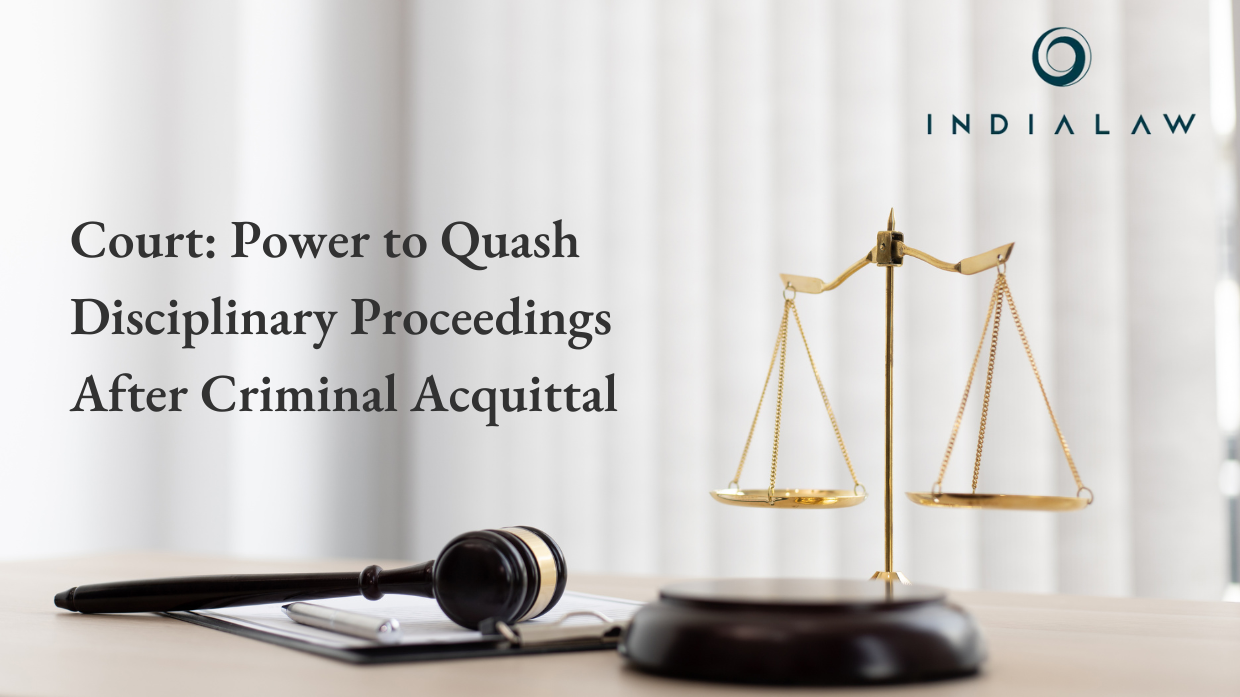Court Holds Power to Quash Disciplinary Proceedings Based on Same Charges in Criminal Proceeding That Concluded in Acquittal: Supreme Court

The Supreme Court (“SC”) in the case of Ram Lal v. State of Rajasthan[i],dealt with the validity of disciplinary proceedings based on same evidence/ circumstances/ witnesses in a criminal matter that was decided by the appellate court and the accused was acquitted.
The SC Division Bench comprising of Justices J.K. Maheshwari and K.V. Viswanathan stated that “…if the charges in the departmental enquiry and the criminal court are identical or similar, and if the evidence, witnesses and circumstances are one and the same, then the matter acquires a different dimension.”‘
Facts of the case
Ram Lal (“the appellant”) was a constable with the Rajasthan Armed Constabulary in Jodhpur and was appointed on 15.12.1991. In 2022, an FIR was registered against the appellant under Sections 420, 467, 468 and 471 of the Indian Penal Code, 1860 (IPC), soon thereafter a chargesheet in a departmental enquiry was also issued against him.
The identical allegation in both the proceedings was that he had altered his date of birth from 21.04.1974 to 21.04.1972 in his class 8th marksheet. It was alleged that this was done to project himself as attained majority at the time of recruitment for the post of constable.
The trial court convicted the appellant for the offence of cheating under Section 420 of the IPC and sentenced him to undergo three years’ imprisonment along with a fine of Rs.5,000/-.
An appeal was filed against the impugned order and the Additional District and Sessions Judge allowed the criminal appeal and acquitted the appellant. However, in the departmental enquiry proceedings, the enquiry officer found charges proved and vide order dated 31.3.2004 dismissed appellant from his service.
The appellant represented his reinstatement, and he subsequently filed a writ petition before the High Court (“HC”) for quashing the dismissal order dated 31.3.2004 passed by the Appellate Authority, and the orders refusing to review and reconsider the said order.
The HC dismissed the writ petition and held that the standard of proof produced in the criminal proceeding and during the departmental proceeding is different. The learned Single Judge found no infirmity in the order of the disciplinary Authority. Being aggrieved by the decision of the HC, an appeal was filed before the SC.
Issues before the SC
- Whether the dismissal of the appellant from service pursuant to the departmental enquiry was justified?
- What is the effect of the acquittal, ordered by the Appellate Judge in the criminal trial, on the order of dismissal passed in the departmental enquiry?
Observations of the SC
While considering the review power of the HC, the SC relied on the case of State Bank of India vs. A.G.D. Reddy[ii] and clarified that the Disciplinary Authority’s order can be only be reviewed to examine the legitimacy of the decision-making process.
The SC clarified through the decision of the court in Deputy Inspector General of Police and Another v. S. Samuthiram[iii] that mere acquittal by a criminal court will not confer on the employee a right to claim any benefit, including reinstatement.
Decision of the SC
The SC while analyzing the merits of the Disciplinary Authority’s order stated that it had ignored the material evidence while considering the proof of charges against the appellant.
The bench stressed that it is evident from the appellate court’s order that it had acquitted the appellant after due consideration of the prosecution evidence. That the court had applied its judicial mind and concluded that the prosecution could not prove the charges levied against the appellant. The findings of the appellate court in the criminal case clearly indicate that the charge against the appellant was not just “not proved” in fact the charge even stood “disproved” by the very prosecution evidence.
The SC stated that “The conclusion that the acquittal in the criminal proceeding was after full consideration of the prosecution evidence and that the prosecution miserably failed to prove the charge can only be arrived at after a reading of the judgment in its entirety. The court in judicial review is obliged to examine the substance of the judgment and not go by the form of expression used.”
After due analysis of the facts and circumstances, decisions of the lower courts, the SC concluded that the disciplinary proceedings conducted by the authority were vitiated and deserved to be quashed. It added that ‘It is well settled that if the findings of the disciplinary authorities are arrived at after ignoring the relevant material the court in judicial review can interfere’.
The SC agreed to the averment of the appellant that overwriting in the application form was to correct an error and noted that if his class 8th marksheet reflected his date of birth as 21.04.1972 and there is no correction or manipulation in that document, he cannot be penalized.
In the facts and circumstances mentioned above, the division bench directed the appellant’s reinstatement along with all consequential benefits including seniority, notional promotions, fitment of salary.
Conclusion
The division bench stated that “If the court in judicial review concludes that the acquittal in the criminal proceeding was after full consideration of the prosecution evidence and that the prosecution miserably failed to prove the charge, the Court in judicial review can grant redress in certain circumstances.”
It added that “The court will be entitled to exercise its discretion and grant relief, if it concludes that allowing the findings in the disciplinary proceedings to stand will be unjust, unfair and oppressive. Each case will turn on its own facts”.
It was clarified by the SC that the court in judicial review is obliged to examine the substance of the judgment and not go by the form of expression used.
[i] Civil Appeal No. 7935 of 2023, 2023 LiveLaw (SC) 1042
[ii] 2023:INSC:766 = 2023
[iii] (2013) 1 SCC 598
By entering the email address you agree to our Privacy Policy.



